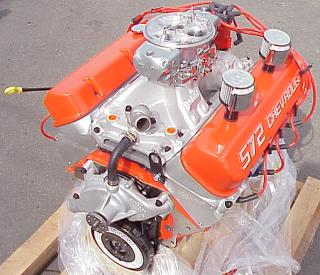Hib Halverson said:
What's interesting is the new LS7 is rated at 500 SAE net horsepower. If you were to test the LS7 the same way GM did back in the 1960s. it'd probably make 560hp...maybe even more.
Okay, here’s the deal.
Back in the late ‘60’s and early ‘70’s, the switch was made by automobile manufacturers from advertising Gross Horsepower Ratings to advertising the more realistic Net Horsepower Ratings. For Corvette, the last year that the Gross Horsepower Ratings were shown was 1971. The Net Horsepower Ratings were also shown:
To avoid, I hope, the flywheel power versus rear wheel power ratings confusion that usually rears its head at this point, let me state positively and absolutely that the power ratings advertised by automobile manufacturers are ALWAYS rated at the flywheel. They are ENGINE rating numbers and not POWERTRAIN (Engine, Transmission, Differential Gear) ratings. The ratings at the rear wheels are another story.
Also confusing is the fact that the early ‘70’s engines lost power due to lower compression ratios required to accommodate unleaded fuel needed for catalytic converters. That is not part of this discussion, either.
We are talking about the difference between an engine with virtually no accessories, no intake restrictions and no exhaust restrictions (GROSS FLYWHEEL POWER) versus an engine with all the accessories, full intake system and full exhaust system (NET FLYWHEEL POWER).
Also, we are just doing this for fun so don’t get mean. If you find errors in my logic, get helpful and let’s produce a better answer.
Okay, for the two people still with me (SWC and Runge), here are my assumptions:
1971 Standard Engine – 210 Net Horsepower and 270 Gross Horsepower
210/270 = 0.7778
1971 LT1 – 275 Net Horsepower and 330 Gross Horsepower
275/330 = 0.8333
1971 LS6 – 325 Net Horsepower and 425 Gross Horsepower
325/425 = 0.7647
So let’s be conservative (and make the huge assumption that a modern, electronically controlled, fuel injected engine would act anything like a carbureted early ‘70’s engine on the dyno) and use the 0.8333 ratio on our 500 NET FLYWHEEL HORSEPOWER 2006 C6 Z06 engine.
500/0.8333 = 600
SIX FREAKING HUNDRED HORSEPOWER!!!
600
Okay, I can’t resist either, let’s use the Big Block number 0.7647 and see what we get. (Yes, I know the LS7 in the 2006 Z06 is NOT a “Big Block” – remember, we are having fun here.)
500/0.7647 = 654
SIX UNFREAKING UNBELIEVEABLE HUNDRED AND FIFTY HOLY S**T FOUR HORSEPOWER!!!!
654
Remember, these are assumptions. If ANYONE has access to real GM dyno numbers – I am led to believe they still do GROSS numbers – they would make very interesting reading.
David
I love this stuff!!













